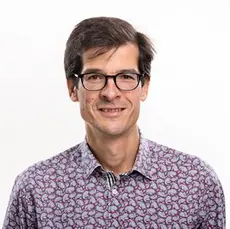Sustainable Energy Systems and Smart Cities

„We want to shape sustainable and smart energy systems of the future. For this, we are committed in application-oriented research and teaching. Our contribution ranges from comprehensive technology assessments, on stakeholder involvement to sufficiency strategies.“
Prof. Vicente Carabias-Hütter,
Head of Research Area Sustainable Energy Systems INE
How can we design energy systems so that they fulfil a wide variety of needs in the long term?

The Institute for Sustainable Development (INE) views technological, economic and societal changes and their complex interactions from a sustainability perspective. We conduct applied research in order to identify future demands on technologies and to determine how these technologies can be combined to create sustainable systems.
For the researchers at the INE, researching and promoting sustainable energy systems means:
- identifying issues that are relevant for the future
- anticipating the development and acceptance of technologies
- developing indicators to assess sustainable energy systems
- evaluating the social acceptability of infrastructure projects
- analysing the potential of participative approaches
- identifying the needs and behaviours of individuals
- developing design principles for sustainable energy regions and innovative business models
We can work with you to further the sustainability of the regions by providing scientific support for your project and by making our experience and expertise available.
Current projects
- Living Lab Lokstadt
A test hub in the centre of Winterthur for research into sustainable lifestyles. It is part of the SWEET-SWICE SFOE project. - Smart City Guide
The "Guide to the Implementation of Smart City Initiatives in Switzerland" presents in three phases how a smart city can be initiated and promoted with projects, how a holistic strategy is created and how it can be permanently established in the city. - Transition of regional energy Systems (TREES)
Switzerland is facing an energy transition, entailing a shift from centralized to decentralized power generation. With the simulation platform “TREES”, decentralization dynamics and value creation within the Swiss energy system are analyzed from a regional perspective.
Finished Projects: Please find an overview about finished Projects
Course of study and continuing education
The Institute of Sustainable Development (INE) is involved in following course of study and continuing educations:
- Bachelor's degree Energy and Environment Engineering
- Bachelors degree Transportation Systems
- Master’s programme at the Institute of Sustainable Development
- Continuing education Integrated Risk Management
- Continuing education Mobility & Logistics
Projects of the students
The ZHAW carries out course projects every autumn semester and Bachelor’s thesis projects every spring semester. Thanks to our position at the interface between industry and science, the INE (Institute for Sustainable Development) is able to give industry partners the opportunity to develop their ideas and realise innovative approaches by collaborating on student research Projects.
Interested? Please send us an e-mail. We look forward to hearing from you.
Bachelor's theses
<svg xmlns="http://www.w3.org/2000/svg" viewbox="0 0 256 256" class="iconpack phosphor phosphor-arrow-up-right-bold" fill="currentColor" role="img"><rect width="256" height="256" fill="none"></rect><line x1="64" y1="192" x2="192" y2="64" fill="none" stroke="currentColor" stroke-linecap="round" stroke-linejoin="round" stroke-width="24"></line><polyline points="88 64 192 64 192 168" fill="none" stroke="currentColor" stroke-linecap="round" stroke-linejoin="round" stroke-width="24"></polyline></svg>Bachelor's theses co-supervised by the INE (2017)Bachelor's theses co-supervised by the INE (2016)